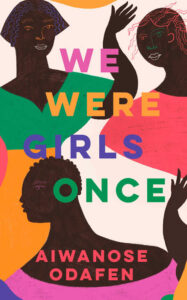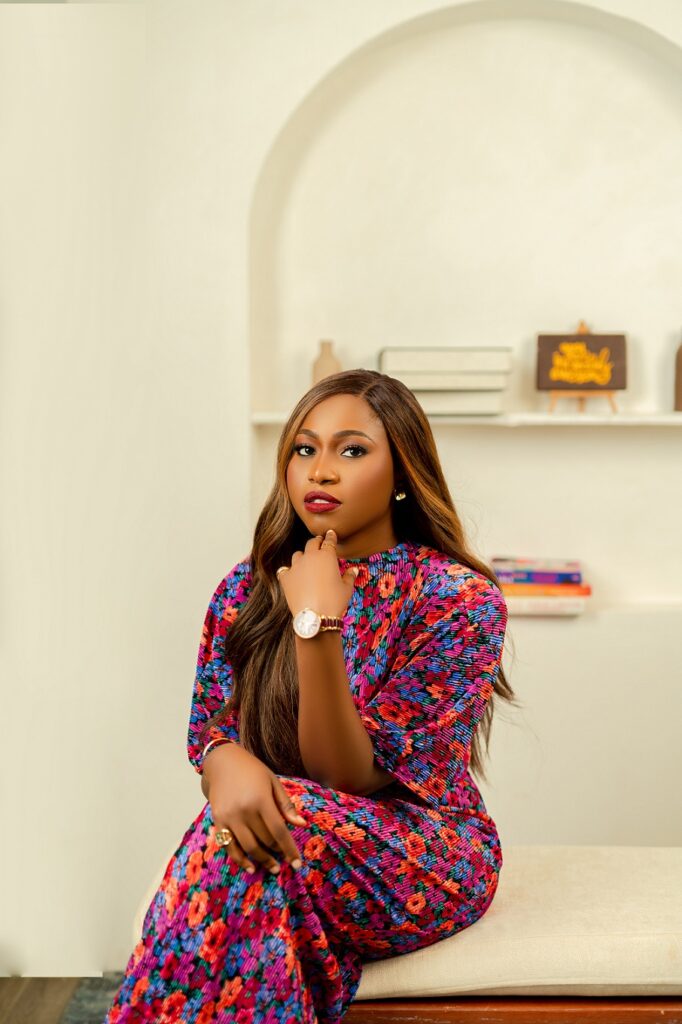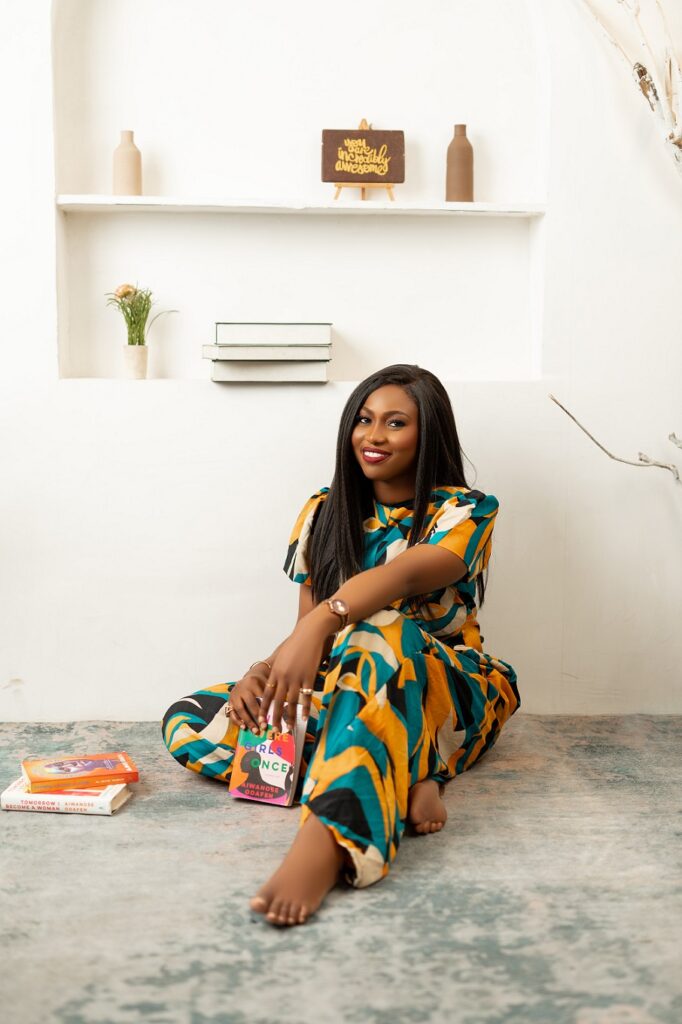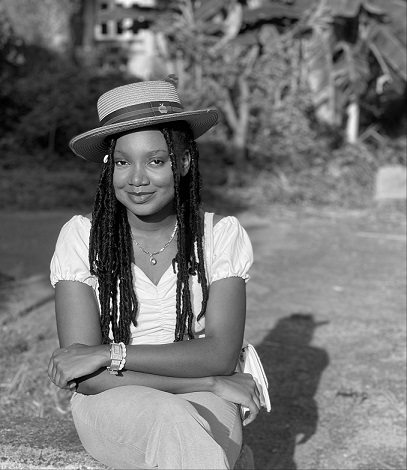Aiwanose Odafen had seen so many of her aunts persevere in difficult marriages, but it was when it happened to a friend of hers that she felt the need to encourage the women around her to push back. Her friend, only 22 then, was in an abusive marriage. “I felt she was too young to be dealing with those sorts of issues,” Odafen told me. “I have a bit of a savior complex, which got me into wanting to get her out of it.”
Her frustration crystallized when another friend warned her to steer clear of someone else’s marriage. This friend reasserted to her the religious code governing homes and marital unions: What God has joined together, let no man put asunder. Though deterred, she knew she could not fold her arms and watch, that she needed more people to know that too much was still being expected of women. Her solution was to write a novel that would capture those experiences, make people question what they think they know about women. She opened her laptop and put down all the things that annoyed her about being a woman.
At the time, Odafen had not attempted a novel before. She had fancied herself a nonfiction writer, hoping to one day publish a collection of essays, but the complex circumstances of the women in her life pulled her into storytelling. With her background in finance and consulting, characterized by long hours and structured protocols, she approached it with a goal-oriented mindset.
“I was very chronological,” she said, chalking it up to her numerical inclination. “I followed the story through each development to the end. I wrote chapters one after the other, harboring the ideas till I got to the end. It pinches me to make leaps in narration.”
At the 2018 Purple Hibiscus Creative Writing Workshop, run by Chimamanda Ngozi Adichie, Odafen had an epiphany. Her writing tended to be theme-driven, and she realized that, at some point in her novel, she had forgotten to tell a story. It was a journey of self-awareness and of confronting her artistic flaws. In 2022, her debut novel, Tomorrow I Become a Woman, was published in the UK by Scribner.
Set in the 1970s, Tomorrow I Become a Woman follows Obianuju, who, pressured by her mother, marries Gozie, because he seems to be the ideal man for her, being handsome, Christian, and Igbo, like her family. But she has feelings for Akin, whom her mother would not accept because he is Yoruba. The story unfolds in the aftermath of the Biafran War, in which the Igbo and other ethnic groups of the old Eastern region suffered defeat and afterwards faced economic attrition. Odafen chose the ‘70s not just to capture post-war tribal proclivities but to particularize injustices faced by women at the time.
“I feel like, these days, when we try to have conversations about certain things that women go through, people tend to mask the truth of the experience in modernity,” she told me. “People are so disingenuous, they just blatantly lie, and I didn’t want to have that argument. Hence, I wanted to write history that spanned 20 years before the 2000s. I didn’t want anyone to dispute the reality of how women were treated and the limitations around women at that time.”
Despite the lack of a major promotion campaign, Tomorrow I Become a Woman was a relative word-of-mouth hit in Nigeria. It was named among Open Country Mag‘s 60 Notable Books and, later, made the Rovingheights Bestseller List: Presented with Open Country Mag, as the 12th top-selling fiction book of the year.

Nigerian literature, pre- and post-independence, was dominated by male writers, most of whom coloured their female characters with unending stereotypes, as incapable, dependent, and peripheral. In 1954, Mabel Segun became the first published female poet — three poems in a German anthology — but it was over a decade later, in 1966, that Flora Nwapa published Efuru, the first novel by an African woman, and women’s agency, for the first time daring and confrontational, was centralized via the eponymous character.
Feminism was a new conversation, embraced, theorized, and divisive, and Buchi Emecheta, who succeeded Nwapa as the country’s pre-eminent female novelist and went on to become the first successful Black female novelist in the UK, argued for a feminism that was willfully African, a “feminism with a small f.” Her novels, though, excavated a range of feminine experiences hitherto not committed to page, from the triumph over adversity in her semi-autobiographical 1974 debut Second Class Citizen, in which the protagonist survives a violent marriage and becomes a writer, to the maternal sacrifice in 1979’s celebrated The Joys of Motherhood.
In 1972, Zulu Sofola, the country’s first published female playwright, released Wedlock of the Gods, her third and best-known work. In the north of the country, pacing behind the south in Western education, Zaynab Alkali led the charge with 1984’s The Stillborn. But even as they broke new professional grounds, Nigeria’s female writers remained constrained in society. It was inevitable that most of their writing did no more than affirm the presence of systemic barriers.
The 2003 emergence of Chimamanda Ngozi Adichie, with Purple Hibiscus, recalibrated Nigerian literature, never mind feminist writing, with a newer, freer flavor and a willingness to tackle broad subjects, which she expanded even further with Half of a Yellow Sun and Americanah. Sefi Atta, at the same time, brought a feminist zeal with 2005’s Everything Good Will Come. The specificity of femininity has since been a firm subject, with Chinelo Okparanta introducing stories of queer women, in Happiness, Like Water and Under the Udala Trees, and Ukamaka Olisakwe building on female perseverance in Ogadinma. It is this convention that Odafen works in.
“I’m standing on the shoulders of my forebears,” she told me. “I’m building on the work they’ve already done and linking both the past and the future. When you talk about Buchi Emecheta and talk about Chimamanda Adichie, they really spoke for women and represented real African women’s issues.”
It may be true that Nigerian society is gradually evolving past the sexism of conditioning women’s lives to nothing other than marriage and childbearing, but Odafen is also looking at the burden of reinforced misogyny, passed on over time. Tomorrow I Become a Woman is only the first in what she plans to be a trilogy documenting three generations of women in the family, from the 1940s to the 2010s. The second book, We Were Girls Once, released in April by Scribner, is set in the 1990s and 2000s, with female friendship as its focus.

The three young women, Ego, Zina, and Eriife, continue the lives led by their mothers, who bonded on the University of Lagos campus, and their grandmothers, who first connected on a dusty Lagos-bound bus. Ego — Nwakaego — is the first of three daughters from Obianuju’s marriage to Chief Dr. Chigozie in the first book. Ego’s father’s lack of a male heir deflates his sense of self-importance, so much so that he takes out the frustration on his wife and, on one occasion, on Ego. Despite the domestic violence, Ego’s grandmother urges Ego’s mother to stay in the marriage, to avoid the stain of divorce.
Odafen’s feminist fiction is class-conscious. It is in how Ego’s father traps his wife in financial neediness so that she, by default, stays beneath him and does his bidding. Ego reflects on it: “My father hardly, if ever, handed my mother raw, hard cash, but he’d ensured she looked the part of the wife of the man he was.”
Here, gender intersects also with race. As an immigrant Nigerian woman working in London, Ego’s random Twitter rants are as much an escape from the wildness of the world as they are some form of closure. Her friends, Zina and Eriife, have it no better. Zina is betrothed to a man she knows nothing of, and Eriife sinks into politics as the wife of a much older man.
“As I was writing Tomorrow I Become A Woman in 2017, I knew I wanted to tell the stories of Uju, Ada, and Chinelo’s daughters as I got to know the characters,” Odafen told Afreada. “But [I] had no idea exactly what the story would be. . . I was eager to explore trauma and its different offshoots, how it manifests under multivariate circumstances, but most importantly, I wanted to explore the lottery of birth.”
Obianuju’s mother wants the best for her daughter but only knows that to be marriage. Even when marriage proves ruinous, she clings to what she knows.
“I wanted people to also sympathize with this woman who had gone into marriage at 16, lost her closest brother in the war, had three sons with a husband who simply was not a good man to her,” Odafen said. “Hence, fighting against a somewhat changing world is all she knows to do, and she tries to hold on desperately to what she knows. In her mind, she is doing what is best for her daughter. She is not trying to be wicked; she thinks her daughter is going astray and tries to lead her back to the right path, even at the expense of hurting her.”

When Odafen briefly vacated her chartered accounting career, and her hard-earned MBA from Oxford, to become a writer, her family disagreed with her choice. Although she wasn’t sure even she fully understood why she made the switch, she believed there was a path for her. In 2020, her short story “Faces” was longlisted for the Commonwealth Short Story Prize, and two years later, she went to study fiction at the Iowa Writers’ Workshop. She was at the Workshop when Tomorrow I Became a Woman made the Nigerian bestseller list. Now that she has her MFA, she is planning to return to a day job.
Once, during her first life in the corporate world, she received professional feedback on her dressing at work, that she did not wear heels. Being 5’ 10, she hadn’t imagined that heels were expected to be a staple in her wardrobe. Heels made her uncomfortable, and, after that feedback, she was determined to never wear them to work.
“We live in a society where, as a young girl, every day, it is almost as though you are constantly auditioning for an imaginary husband,” she said. “Your cooking, living, and even appearance sometimes are measured for marriage. It is such a terrible thing to put into children.”
Three weeks ago, an X user posted a thread detailing how his sister’s husband beat her. Odafen quoted the post and wrote: “When I wrote about situations like these in Tomorrow I Become a Woman, I had people DM me to say a family would never do such/I was exaggerating.”
When I wrote about situations like these in Tomorrow I Become A Woman, I had people DM me to say a family would never do such/ I was exaggerating https://t.co/DASHbENtQE
— Aiwanose Odafen (@aiwahannah) July 3, 2024
What she did not add: in her books, there is defiance from some of the women.
“When people read my work, I want my work to make them question things around them,” she said. “In whatever way we can challenge the status quo, I think we should.”
She is conscious of her chosen way. She is careful to depict without sentimentality, to find sharp, cutting, and often courageous departures from the expected. She is committed to mapping the struggles of women, their triumphs, pains, anxieties, and despair through generations. Like the works of her influences, she hopes that hers would resonate for a long time.
“I’m writing for women like me, women of the past, and women today,” she said. “[It] really reflects the issues we deal with and the issues women dealt with in the past. Fifteen years from now, I want people to still talk about my work. I want my work to be timeless, something that women can always read and say, ‘You know what, I get it. This gets me.’” ♦
“Aiwanose Odafen’s Duology of Womanhood” appears in the forthcoming second issue of The Next Generation Series, an Open Country Mag project profiling rising African writers and curators, curated and edited by Otosirieze. The groundbreaking first issue, featuring 16 voices from nine countries, was released in April 2022.
If you love what you just read, please consider making a PayPal donation to enable us to publish more like it.
More Stories from Open Country Mag‘s The Next Generation Series
— Momtaza Mehri’s Fluid Diasporas
— The Overlapping Realisms of Eloghosa Osunde
— DK Nnuro Finds His Answers
— How Romeo Oriogun Wrested Poetry from Pain
— Suyi Davies Okungbowa Knows What It Takes
— Why Tobi Eyinade Built Rovingheights, Nigeria’s Biggest Bookstore
— Remy Ngamije on Doek! and the New Age of Namibian Literature
— Ebenezer Agu on 20.35 Africa and Curating New Poetry
— In Writing Cameroonian American Experiences, Nana Nkweti Crosses Genres
— Oghenechovwe Donald Ekpeki‘s Curation of African Speculative Fiction
— Logan February on Their Becoming
— The Cheeky Natives Is Letlhogonolo Mogkoroane and Alma-Nalisha Cele‘s Archive of Intentionality
— Cheswayo Mphanza on Intertextual Poetry and Zambia’s Moment
— The Seminal Breakout of Gbenga Adesina
— Keletso Mopai Owns Her Story and Her Voice
— Troy Onyango on Lolwe and Literary Magazine Publishing in Africa
— At Africa in Dialogue, Gaamangwe Joy Mogami Lures Out Storytelling Truths
— Khadija Abdalla Bajaber on Fantasy and the Character of Kenyan Writing





